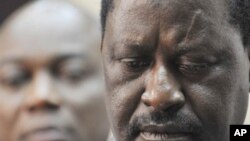Ivory Coast's incumbent government says it no longer accepts the African Union mediator to its political crisis because he is siding with the internationally-recognized winner of November's vote. The mediator, Kenyan Prime Minister Ralia Odinga, says the standoff between rival governments may not end peacefully.
Mr. Odinga left Abidjan after what he says were extensive discussions with both incumbent President Laurent Gbabgo and the United-Nations-certified winner of the vote, former Prime Minister Alassane Ouattara. But he says the breakthrough needed to resolve the political crisis did not happen because Mr. Gbagbo refused to discuss stepping down and twice broke a promise to lift a blockade of Mr. Ouattara's hotel.
Mr. Gbagbo's foreign minister Alcide Djedje says Mr. Odinga has shown he is not neutral in the crisis and the Gbagbo government no longer accepts his African Union mediation.
Djedje says Mr. Odinga failed in his mission, and the Gbagbo government will no longer receive him. He says Mr. Odinga has shown no willingness to seek a durable solution to the crisis.
The African Union, the United Nations, the European Union, and the United States recognize Mr. Ouattara's victory and say Mr. Gbagbo must leave. Mr. Gbagbo says he was re-elected when allies on the constitutional counsel annulled enough Ouattara votes to put him ahead.
The Economic Community of West African States says it is considering military action to remove Mr. Gbagbo.
Mr. Odinga says if the crisis is not resolved, there will be additional economic and financial sanctions and possibly the use of force.
"Time is running out for an amicably negotiated settlement. In addition, the window of opportunity for any amnesty will continue to close if Mr. Gbagbo's supporters continue to commit crimes against civilians and peacekeepers," he said.
Djedje says Mr. Odinga has become a participant in the Ivorian crisis and can therefore no longer serve as a special envoy of the African Union.
Djedje says Mr. Odinga has taken Mr. Ouattara's side and is now trying to convince heads of state who are favorable to Mr. Gbagbo to withdraw their support.
Mr. Odinga left Ivory Coast for talks with heads of state in Ghana, Angola and Burkina Faso.
Ghana and Angola have shown support for Mr. Gbabgo, but Burkina Faso has kept to the policy of West African leaders that Mr. Gbagbo must step down. With military leaders from that alliance discussing how to proceed in the crisis, the U.N. Security Council Wednesday unanimously approved an additional 2,000 peacekeepers for Ivory Coast.
That will boost the U.N. force to nearly 12,000 troops. The U.N. extended the temporary deployment of three infantry companies who had been serving in Liberia and transferred three more armed helicopters from Liberia for the next four weeks.
Incumbent Ivory Coast Government Rejects African Union Mediator




